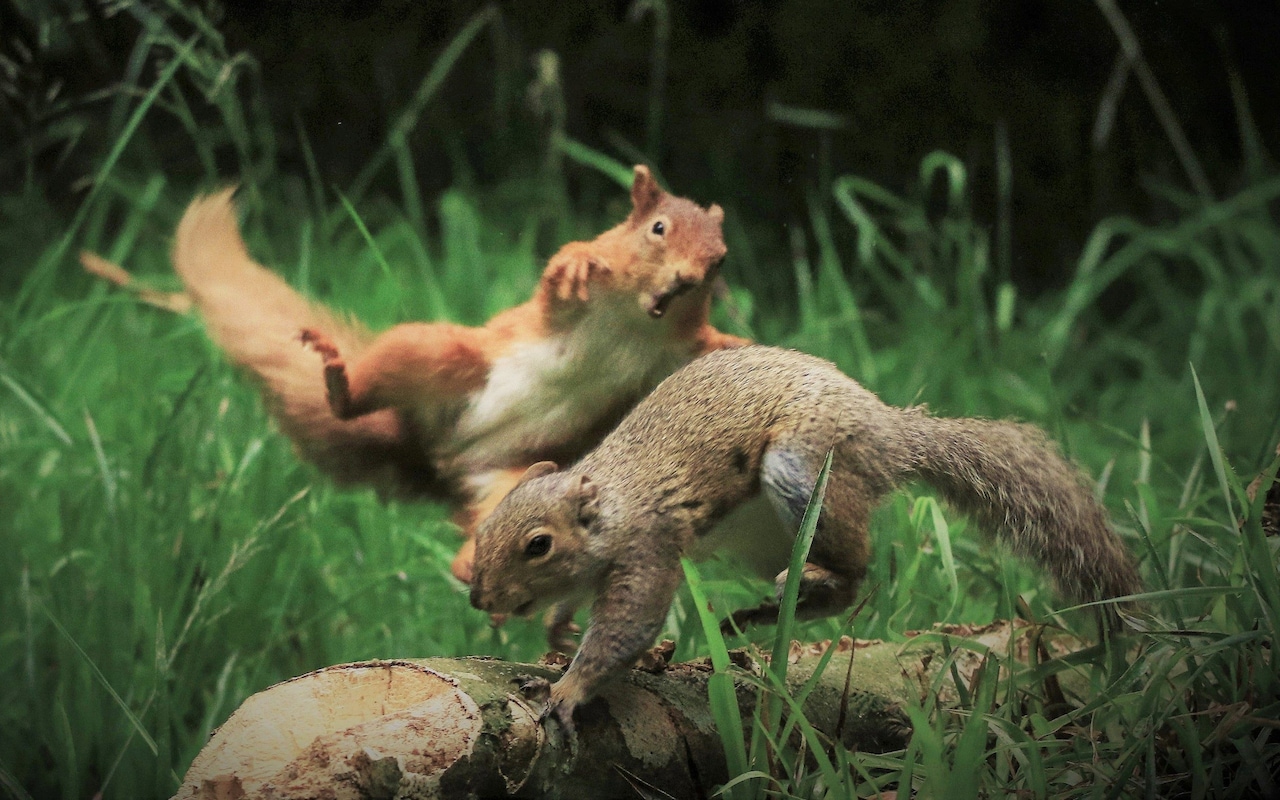By Fakhriya M. Suleiman, MA Global Media and Postnational Communication
In January 2021 the UK government announced that it would back new efforts to significantly curb the grey squirrel population in Britain.
“The plan is to distribute feeding boxes […] with tasty hazelnut spread spiked with oral contraceptives.”
The plan is to distribute feeding boxes in areas with high grey squirrel numbers. In the boxes, grey squirrels will find pots with tasty hazelnut spread spiked with oral contraceptives – unbeknownst to them, of course.
The birth control laced feedboxes are bespoke so that only greys can enter them. The boxes will feature ‘heavy door-hoppers’ which would prevent the smaller reds being able to open them – thus minimising the risk of them also ingesting the contraception.
The grey versus red civil war amongst the squirrel population began with the introduction of greys in Britain from America in the late 19th century. The larger, American greys not only outcompete the native reds when it comes to food and habitat, but also carry the parapoxvirus. The virus poses no threat to greys, but has proven fatal for reds.
Greys have displaced the native red squirrel population across most of the UK. It is estimated that greys have flourished in Britain such that their numbers are estimated at 2.7M and the population is continuing to grow. Reds, on the other hand, are thought to be fewer than 300,000 and have been relegated to mostly living in North Wales and Scotland.
The Royal Forestry Society (RFS) welcomes this new plan. The RFS cite greys as being the cause of £1.1bn worth of damage to Britain’s woodlands annually. Greys are known to strip the bark off of oak and sycamore trees – especially those between 10-50 years old, i.e the younger forest trees. This further threatens Britain’s biodiversity, as oak and sycamore are home to other native mammalian species, as well as insects and birds.
The RFS, however, have also called for more robust action against the invasive greys. They argue that in areas where their numbers are especially high, ‘lethal methods of control’, such as shooting, should be employed – a suggestion animal rights activists have dubbed as inhumane.
The Environment Minister Lord Goldsmith said that the government is also looking into genetically engineering grey females to make them infertile as a long term solution to lessen grey numbers. This would involve altering the fertility gene of grey females and annually releasing newly engineered squirrels into the wild. Nicky Faber, who did research into this at Edinburgh University explained that overtime ‘it will spread through the population so after a certain number of generations, all grey squirrels will have the engineered gene and this will cause a lot of females to be infertile.’
On the other hand, Professor Luke Alphey of the Pirbright Institute in London highlighted that ‘regulatory approval and public acceptance would obviously be essential before any actual use of such technology – that is a long way off. But [research] indicates that gene drives could be a valuable tool in the conservation toolbox.’
For some Brits, simply eating greys is the answer. They argue grey squirrel meat is ‘the most ethical’ meat to eat as it protects both Britain’s woodlands and the native reds. Eco-friendly restaurant Native made news in 2019 when it decided to add ‘grey squirrel lasagne’ to its menu. Chef Ivan Tisdall-Downes of Native argued that greys are ‘one of the most sustainable proteins you can cook. It almost tastes exactly the same as rabbit, but not as gamey.’
In England, Wales, and Northern Ireland native red squirrels are officially classified as a ‘near threatened’ species. Red Squirrels Northern England, a red squirrel conservationist group, say the three ways the public can help the fight to protect reds are by ‘submitting sightings; which are crucial to track the fortunes of red squirrels, join your local red squirrel group’ and lastly, going to visit places such as Wensleydale’s Snaizehome Red Squirrel Trail that are dedicated nature reserves established to home Britain’s native reds.
Photo caption: A native red squirrel photographed in a heated confrontation with a grey that had entered its territory. (Credit: John O’Brien/SWNS)
